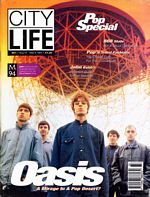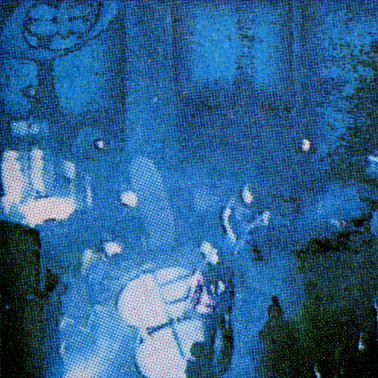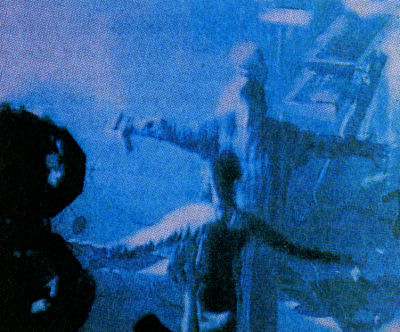| State Of Independence | |
 |
City Life, Issue 261 24 August 1994 Page 12 |
808 State have a new single out now - 'Bombadin' - and an album in the New Year. The unholy trinity spoke to MATT GREENHALGH about the pressures of being a dance band which lived through the first generation, and prospers in the harsh '90s.  My first dose of 808 State was smoked with a successfully scav-enged spliff at the back of a well-known Manchester venue in 1988. I was primarily there to witness another scarcely populated ACR gig, when a piece of sound connected with my mental G spots. Immediately a dreamy, meandering, soothing, drifting feeling overcame me. I remember briefly clocking the support band playing this electronic symphony, then having another toot - soon I was the Cheshire Cat. It was some entrance. Me to 808, and 808 to the world. The symphony, 'Pacific State' was a mind-blower (still is) becoming the granddad signature tune for the dance music revolution that was to happen in the last years of the '80s, and typified the dictatorial role Manchester was about to play. 808 State - Andrew Barker, Graham Massey and Darren Partington - are a dance music band with a difference - they're still going. Eleven singles and seven albums later, they've bludgeoned through the Madchester backlash where others cowardly surrendered. They became global-wise and diversified their fan-base as the dance music virus spread amongst the world's youth.  Now an experienced outfit, they know better than anyone how notoriously fickle the market for a dance band is. As they prepare to release an eighth album, they know they have, to some extent, to submit to the demands of the market, something that conflicts with the raw reality of the band's persona and produce. "We've got to reinvent ourselves as a band again," cringes Darren. "1994 - it's a fucking shame - 808 have been around for quite a while now, but for this new album with new material, we're going to have to re-invent ourselves because there's not enough people out there to support the old name. "It's not a matter of 'do you remember that tune?' or 'remember that gig?' - that's all in the past. We know we've got an album that won't sell in this climate, it's therefore up to us to create the climate. The album's something new and fresh, and people are scared of that because everybody's an expert, or a fucking DJ." There's an underlying feeling from the band's members that 808 State don't receive the respect they deserve. There's no doubting the respect they command from contemporaries and clubbers alike for their artistry and innovation, but whether this respect turns into sales volume is a grey area, and like any non-commercial dance-orientated band with a major label (ZTT) on their back, they are naturally apprehensive about forthcoming material and how far they have to concede to the record and media industries' promotional facades to push it. "If you take this country, how many ways are there of getting you're music across?" asks Graham.  "You've got to get it on Radio 1, you've got to get on Top of the Pops and you've got to get in all those magazines like Select, The Face and NME - it's all so limited and if you don't fit into those formats you might as well give up. Unless you think of alternative methods of getting your message across." "I think the NME is a middle-class student magazine," adds Darren, "and a band like us doesn't fit into that." "It's like Björk," says Graham, "she's been on the front cover of every magazine worldwide, it got to the point where the media was more important than the music. If you can sustain the usual two second music interest than you're in with a chance of selling a load of records. "At the end of the day she knows there's a big fat fucking cheque coming through that door," says Darren. "So she'll put beads and pigtails in her hair and run around the stage like a mouse, she's got a kid to support and she'll be anything the media wants if it pays. You've got to have a decent base in this industry, but what I want to know is why all the big money has to go to Simply fucking Red?" "It's all about hairstyles, innit? Same with Björk," says Andy. "Well I don't know about you, but I'm growing some fucking dreads fast," replies Darren. It's not a bad idea. With no regular vocalist, the band needs a frontman, someone willing to step out from the Roland drum machines and put the boot in. Darren in some hanging-Hucknall dreads would be perfect. No-one volunteers of course, 808 State aren't an 'image' band, and that has its consequences because in any form of modern day youth culture, (which dance-music has probably become the plastic pinnacle of), the 'image', especially the celluloid 'image', constitutes up to 70% of the market game. Kids who buy the record want a piece of the band with it, stick it in their brain and wear it out. It's an obvious statement but bands like Take That, Bad Boys Inc, East 17 and 2 Unlimited do not possess talents that lie in music.  808 State's answer to the 'image' problem is perhaps typical. They're getting on the global highway, introducing an Internet system which will allow their fans around the world (with the technology) 24 hour access to them, as well as an exclusive free album consisting of tracks that never made it onto the market. Be clear though: this is not a fan-club. "We've been approached loads of times to form a fan-club, but the theory behind fan-clubs is to sell merchandise, T-shirts and Take That socks, so we've turned them down," says Darren. "We see the Internet as something for the future of the dance generation, and with it being global, the info's got to be there on hand immediately. You can't expect Mix-Mag or DJ Magazine to tell you what's going on in other countries." "It'll also make life more spontaneous: instead of waiting a month to organise a gig we can do it in a week, we can also hold underground parties without advertising. One person gets hold of the phone number then passes it around," says Andy. "They have a rave organisation like this in Manhattan called NASA. They use the Internet to let everyone know about the rave on Friday afternoon and by Friday night there's 4000 people there going mad. "In this country it's shite. You can't have a bleedin' wedding at the moment without the police turning up." In light of Manchester's non-existent domestic party scene and the inevitable introduction of the Criminal Justice Bill, I'm eager to know if they've got anything planned for Manchester. "If the people are still there, but most of the originals from the late '80s scene have either become victims of the scene, got kids or prefer to stay in with a bottle of wine. You don't see them anymore," says Andy, and he's right. Manchester's party people are notorious for their disappearing acts, going under or going to prison. "If we do it we've got to get the young blood out and educate them in the process," says Darren. "Their history is Altern8, 'Vicks' and cycling masks. They don't know anything about the high-energy scene which spurned this scene or early hip-hop or electro. They talk about Shelley's nightclub in Stoke (noted for rave) as though it was 10 years ago, 'the good 'ol days', and you think 'fuckin' hell, what about the Thunderdome, the Kitchen or Jimmy Muffin's 'sweat it out' parties underneath Affleck's?"'  But what were 808's social and nightclubbing education before the sweatshop of the late '80s? "Graham was on the alternative scene and used to walk round in green sandals. I personally thought Rotters and the Ritz nightclubs were blinding," says Darren. "In the Ritz you used to get molested by some real rough women - I mean hard as nails," adds Andy, and you probably still do. "But occasionally, like in the late '80s, comes a twist, and that's what the club scene needs again right now, because nightclubs are reverting back to a mirror image of the early '80s in Rotters, lads standing around girls and no-one really doing much," says Darren. "The DJs are shit anyway, no-one's got any balls anymore," says Andy. "We could have played 'Pinky and Perky' at the Thunderdome and the crowd would have had it. We've just got two new nightclubs in Manchester, Paradise Factory and Sankey's Soap and what have they done? Fuck all!" Clubbing-wise, they've taken on the mantle at one of Manchester's best heterosexual party nights, 'Foundation' at Home: "The promoter was pretty anxious to know what was on our playlist, scared we wreck the night or something," Darren chuckles. They also make a welcome return to the airwaves, when the North West's version of 24-hour dance station Kiss FM is launched in the Autumn. They were an automatic choice for Kiss 102 after their show on the now defunct Sunset became the only one with any ratings, tuning into thousands of young ravers each Tuesday with a mixture of the latest tunes and blatant amateur production. The show was unavoidably northern - top tunes, top laugh. They did the show for the love of it, no money was involved, in fact they lost out. During the turbulent last six months of the station they had to bring their own mixing decks. It shows one of 808's prime qualities - dedication. As musicians, DJs and clubbers they are dedicated to the profusion, progression and protection of the ethos of contemporary dance music culture, of which there are many ills at the moment. Their concern is evident: "I think people are taking their recreation too seriously at the moment," says Graham, quite seriously. With bands like 808 State still on the scene, there's always a chance of that 'twist' for the '90s, as Darren mentioned, being just round the corner. The last fighters of 'Mancunian vibes in the area', show no sign of letting up, cropping up on your Internet, turntable and airwaves, generally staying right 'in yer face.' 808 State play the Manchester Megadog on 17 September, and the unnamed album will be released in January 1995. |
|